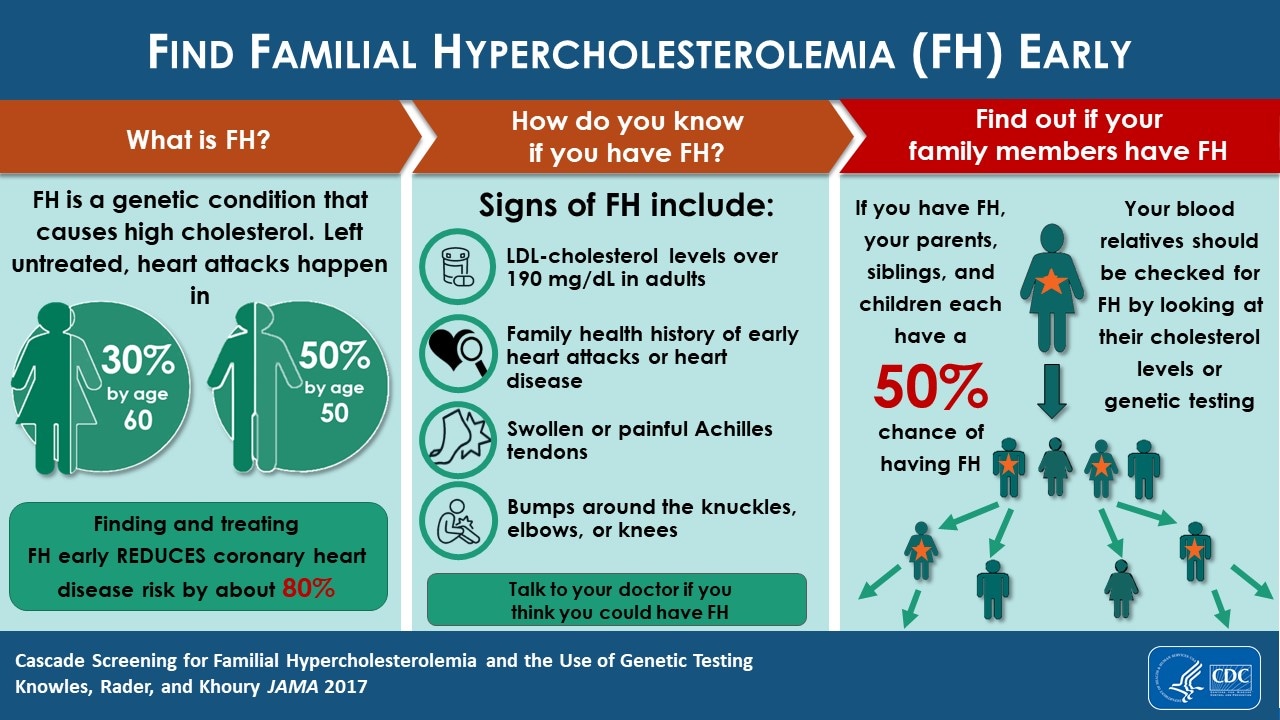Does Heart Disease Run in Your Family?
Take time to collect information about your family health history of heart disease, and share this information with your doctor and other family members. Your doctor can help you take steps to lower your chances of getting heart disease.
Collect and Share Your Family Health History of Heart Disease
Each year in the United States, about 647,000 people die from heart disease. Some medical conditions, such as high cholesterol, high blood pressure, and diabetes, and lifestyle factors, such as an unhealthy diet, lack of physical activity, and smoking, can make you more likely to develop heart disease. In addition, having close blood relatives with heart disease can make you more likely to get heart disease.

Finding and treating familial hypercholesterolemia (FH) early reduces coronary heart disease risk by about 80%.
If you have a family health history of heart disease, collect information on your relatives with heart disease, including what age they were diagnosed. This is especially important if you have a parent, brother, or sister with heart disease. Share this information with your doctor so you can work together on steps to lower your chances of getting heart disease.
These steps can include
- eating a healthy diet,
- being physically active,
- maintaining a healthy weight,
- not smoking,
- limiting your alcohol use,
- checking your cholesterol,
- controlling your blood pressure,
- managing your diabetes, if you have it,
- having screening tests done that your doctor recommends, and
- taking medication if needed to treat high cholesterol, high blood pressure, or diabetes.

Rhiannon writes about living with familial hypercholesterolemia.
The Importance of Family Health History: Rhiannon’s Story
Rhiannon’s father had his first heart attack at age 36 and died from one at age 51. She thought his heart disease was due to his smoking and unhealthy diet, until she got her cholesterol checked at age 30. Her low-density lipoprotein (LDL) cholesterol levels were nearly three times higher than expected for a woman her age. “I had never had my cholesterol checked, because I had always heard that diet and exercise were enough to manage it. It just wasn’t supposed to be a problem with someone who is young, active, doesn’t smoke, and isn’t overweight. Right? Wrong. And, boy, was I wrong.”
Some people, like Rhiannon, have a common genetic disorder called familial hypercholesterolemia (FH). People with FH have increased levels of LDL cholesterol, which makes them more likely to develop heart disease at a younger age and increases their risk of dying from the disease. For many people with FH, diet and exercise alone are not enough to control their cholesterol levels, and they require medications such as statins.
After Rhiannon found out that she had FH, she worried at first, “Would I have a heart attack and die at a young age like my dad?” However, she worked with her doctor to take steps to lower her LDL levels. “I’ve learned how to manage my cholesterol through medication, diet, and exercise. I get my blood [cholesterol] checked regularly… At my most recent check-up, my cholesterol numbers were the best they have ever been.”
Finding out that a person has FH not only helps that person, but can help their entire family. Other members of the family can be tested for FH, and those with the disorder can take steps to lower their chances of developing and dying from heart disease. As Rhiannon explains, “I feel extremely fortunate that I found out about my FH before something major happened to me, and I hope to avoid heart disease with prevention.”

































No hay comentarios:
Publicar un comentario